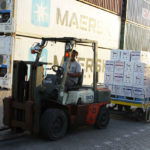The government on Wednesday capped rates for cargo clearance at the Malé port after dockworkers demanded higher pay to work night shifts.
The limits were imposed as a “sustainable solution” for controlling market prices after new rules banning daytime delivery of goods in the congested capital came into force on April 1, the economic development ministry announced, invoking powers under the 1996 consumer protection law.
The new rates were set a day after the economic minister told the press that the transport rules will not be allowed to become “a license to increase prices”.
“If dockworkers increase fees the government will intervene and open up that service,” Mohamed Saeed warned when asked about workers at the commercial harbour doubling their fees after ending a short-lived strike.
“Right now the dockworkers’ service remains controlled. But we will open it up. If that doesn’t solve it, the government will solve it, that is even if it means providing that service from a government company.”
After unloading cargo during the day, porters continued to charge higher fees Tuesday night to stack the vehicles that deliver fresh supplies across the city.
“It is not easy for us to work all day and night,” a porter told the Maldives Independent on condition of anonymity. “So what does he [Saeed] want? We do not have a choice here. And now the government is threatening us instead of showing us a way out. They should be finding an appropriate solution for everyone.”
Following the rates control, the Maldives Ports Limited asked porters to renew their registration. Work licenses will be revoked for those who fail to register within seven days, the state-owned ports company warned.
Saeed meanwhile announced Tuesday that a hotline will be launched for the public to lodge complaints about prices. Restricting goods transport hours to after 6 pm is having the desired effect of unclogging chronic traffic jams in Malé’s narrow roads, he said.
The economic ministry previously warned businesses of action to control prices as media reported sharp rises in the price of eggs, onions and potatoes this week.
Saeed met with business representatives and clearance agents Wednesday morning to discuss challenges posed by the new transport rules. A businessman told newspaper Mihaaru the minister said the government was ready if necessary to send out an MPL team to clear out cargo.
While larger companies are authorised to use their own vehicles, most businesses rely on rented vehicles and hired stevedores.
A business that manages a group of workers said they increased fees from MVR2,500 (US$162) to MVR6,000 (US$390) for clearing out a 20-foot container and from MVR5,000 to MVR12,000 for 40-foot containers.
But the new rates limit the rate for clearing a 20-foot container to MVR2,500 before 12 am and MVR3,000 after midnight. The rate for 40-foot containers was capped at MVR5,000 before 12 am with an increase of MVR5,00 thereafter.
Higher fees can be charged for handling glass sheets.
At yesterday’s press conference, Saeed advised patience while businesses and workers adjust to the new rules, praising President Abdulla Yameen’s four-year administration for keeping inflation stable and taking on longstanding problems.
He also threatened measures targeting lorry drivers if they charge higher fees for deliveries at night. But there have been no reports of increases, he noted.
As the MPL also changed its clearance hours in line with the transport rules, vehicles now enter the port at 5 pm to start loading general cargo and perishable items. Loaded vehicles are allowed to leave after 6 pm.
Flanked by the ports company boss, Saeed denied that the rules were introduced abruptly and insisted that businesses and stakeholders were consulted.




















